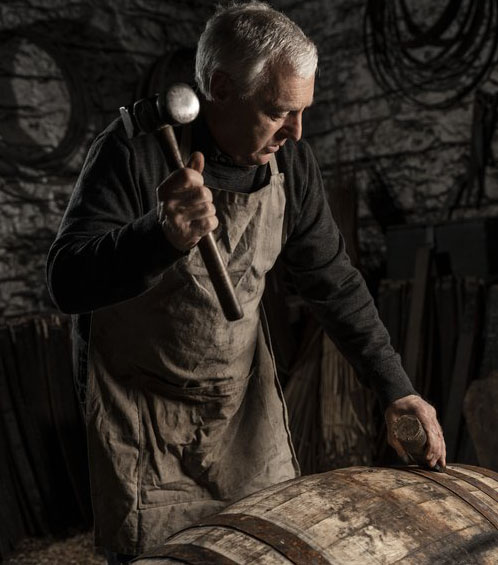
GER Buckley is a man whose knowledge of wood grows far beyond his professional life. As Head Cooper, Midleton Distillery, Ireland, he takes most pleasure in conversing with woods. To him, wood may be an inanimate object, “yet it has a personality – you feel a bond with it – it’s a living, breathing organism.”
He proudly states that “50 per cent of a whiskey’s taste comes from the wood – so the wood and the distillation process have an equal effect on the taste.”
A true craftsman in the purest form of the word, Ger is a fifth generation Midleton Cooper who uses the same methods and tools as his grandfather. His passion stems not only from his family’s lineage, but also from his fascination with the varied attributes his preferred source material allows.
The tools of his trade are an extension of Ger himself. “I collect and interpret tools – I’m interested in the way someone may use a tool differently to myself,” a fact made evident by one of his most treasured possessions, a 90 year old mallet, with a handle worn thin by generations of family use.
It was during his formative years as an apprentice to his own father that Ger became acquainted with the ancestry of his role, with the methods of coopering undergoing just the slightest of changes since the Roman Empire.
“All my tools are in my workshop. I try to maintain and make sure that they are sharp. A lot of them might end up in the local museum where they will be preserved properly. A lot of craft persons lose their tools when they are no longing there to keep it. These are not just hand tools. Maybe someone can come along and take up the trade. That company may be anxious to see someone in my family take up the coopering. That would be seven generations,” he recalls.
“The tools speak to me everyday. They are the same tools I started with almost 40 years ago. I have no new tools. The tools here with me are not the ones I use on a daily basis. I wouldn’t let those tools leave my shop. Those tools have sentimental value to me. My old tools belonged to my grand dad and they were passed on to me,” he says.
Ger adds, “it’s a unique trade. At other copperages, I do masterclasses and I show them tools that have never been seen. I had to use loan them the tools to make barrels. I loaned them for five months before I got it back. Looking back to see the young Cooper’s do the same work that I have done for many years is gratifying.”
Is it a male-dominated industry?
“The trade is male-dominated but you can have women Coopers now. I would have no issue having a woman as the next cooper because there are a lot of machines that can be used now for coopering that does all the heavy work. It is still physical but it is not beyond the bounds of a woman cooper. The funny thing is that the craftspeople that I have met that are women are better craftspeople, more meticulous, more care and I think the same will happen if we have a woman cooper,” he says.
“I have two daughters but maybe a grandson may come along. One is in medicine and the other is in law. I have trained two coopers over the last 10 years and my latest qualified in March. It’s not a university training. There are so little coopers in the world right now.”
He reveals that in the past, the Cooper’s hand is swollen, bruised, cuts. When a copper goes out to have a few drinks, he could dress up in a beautiful suit but you couldn’t see his hands because he’d fold them. If you saw his hands, you would know how hard he had worked with them. “But the hands always gave them away.”
What endeared you to the craft for this long?
“It all started with the love for forestry,” he recalls.
“When I started first, I was 16. They are all electricians in my mother’s family. I was 16 turning 17 when there was an opening for a cooper. My dad said I have to go for the interview. He was a former cooper and was very influential. He just came to the company and said you’re hiring my son. So, I did one interview. I didn’t have to do a CV.”
He reveals, “when I started my working life, I used to repair and make barrels. They would come in bundles. I would repair the barrels. There may be leaks. Some barrels may be broken. I would repair the big cherry casks. As time went on, I became the foreman- the head cooper and my responsibility include making sure that all the barrels in the warehouse are properly maintained and in good condition. Every barrel that comes to Middleton is handled by a cooper and examined visually for any defects. What we don’t want is to put a barrel is a warehouse and have a leak. Wood is still wood. It can still break at anytime. It can cave. We do get leaks but nothing compared to what we were getting when we started. The standard has gotten so high. We visited other copperages where we got barrels from. We visited France, Spain and America and we would visit forests. We are very mindful of where we get our wood. So when we get new barrels, we want the farmer to be certified to ensure that the forest is sustainable and the wood is traceable, and it is from a healthy forest. And you maintain it properly. We plant trees more than we cut it to replenish. We don’t do that for American barrels that we bring in to UK.”
Ger notes, “it’s a long journey to get to where I am today. I have been in copperages in Egypt, Syria, Turkey, Romania, and they do things differently from the way I do them.”
To objectively converse with woods, he said: “You have to decide what types of woods you can use or not use. Some woods are poisonous. The oak is the king of all the woods. It’s the most valuable. It enhances the taste of whisky. About 75 per cent of the taste is from the wood. Sometimes when I open up a barrel and I invite people to smell it, it is a fantastic smell of the barrel from the whiskey. What you smell is the oak.”
According to him, “I make furniture from my barrels. I made this for my granddaughter. I made toys from barrels. I made chairs, tables, candle holders from barrels. It’s good for fencing and floors. I have made floors out of barrels. There is no waste for the barrels.”
He says you can only use the barrel once. “We buy direct from the farms. The barrels are made directly for us in the cooperage and we supervise. They come back to Middleton and every detail is on top of the barrel. We are aiming to get all barrels from sustainable, traceable sources. Any barrel made from poisonous tree will make poisonous whiskey. We make barrels from palm trees, oak and we use different oaks for different flavours.”
Ger is responsible for ensuring that the Distillery’s one million oak casks are in peak condition at all times. “I’m mostly based on the wood side of business and the barrels. We have two million barrels in the warehouse. After the heating, we lose about 40 per cent of the whiskey through evaporation. The air passes through and the casks interact with the environment where they are placed. The air comes into the whiskey as well through the woods.”
Being your second time of entry into Nigeria, what are you excited about?
“The people are friendly and amazing. Nigerians are really good-looking people, which make me feel really small. The last time I was here, the guy staying with me at the hotel was Anthony Joshua. He was really friendly. His arms are like three sizes of my legs. He is about six foot six. I wish I looked like that,” he says. “If Nigeria has the infrastructure that you’ve got in the US, they will dominate many fields.”






